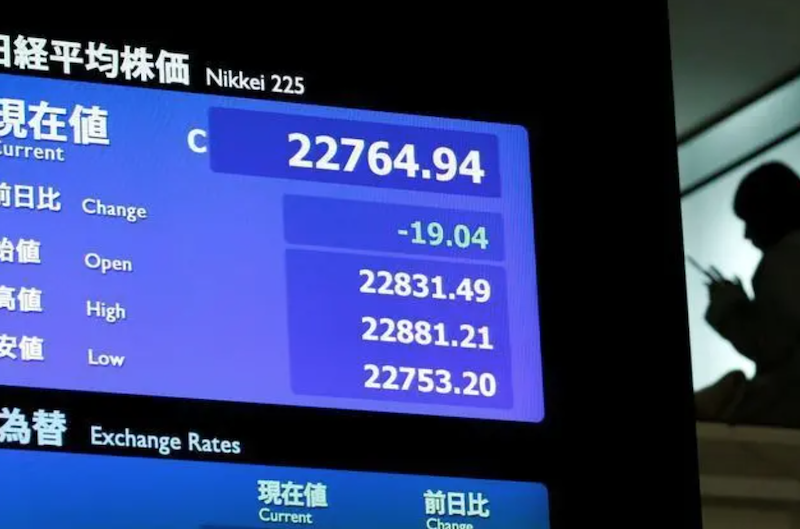Asian stocks slipped on Thursday as the looming threat of another round of tightening by the world’s central banks and China’s rocky recovery brought the mood down across trading floors.
Global banking chiefs reaffirmed their resolve to beat inflation, warning rates may need to rise further, while the yen and yuan struggled to lift from lows amid jitters of intervention.
But the yen’s weakness lifted Japan’s Nikkei share gauge for a second straight session, boosting exporters fortunes and overshadowing profit-taking by some investors.
The Nikkei rose 0.12% to close at 33,234.14, after jumping as much as 1% earlier. The broader Topix index, however, slipped 0.10% to 2,296.25.
Also on AF: US, China to Boost Number of Flights Between Their Countries
Shares of Nissan Motor jumped 4.17% as the yen’s slide to a seven-month low lifted the value of its overseas sales. Rival Suzuki Motor rose 3.41%.
The yen has steeply depreciated recently, as the Bank of Japan signalled it would maintain its ultra-easy monetary policy for now, even as other major central banks move on a tightening trajectory.
The currency slid to 144.62 per dollar on Wednesday for the first time since November 10, nearing levels that prompted the government to intervene last year to prop up its currency.
Foreign investors turned net sellers of Japanese equities after 12 straight weeks of purchases, official data showed. The inflows have helped drive a 21% gain in the Nikkei over the past three months, outpacing global indexes.
China and Hong Kong stocks fell, though, weighed down by concerns about weak recovery in the world’s second-largest economy and a lack of strong stimulus.
Data on Wednesday showed annual profits at China’s industrial firms extended a double-digit decline in the first five months as softening demand squeezed margins, reinforcing hopes of more policy support to bolster a stuttering post-Covid economic recovery.
And a Reuters poll showed on Thursday that China’s factory activity likely contracted for a third straight month in June, albeit at a marginally slower pace.
The Shanghai Composite Index fell 0.22%, or 6.99 points, to 3,182.38, while the Shenzhen Composite Index on China’s second exchange edged up 0.31%, or 6.29 points, to 2,027.32.
Artificial intelligence stocks slipped 0.9%, extending their weekly drop to nearly 10%, with US officials considering tightening an export control rule designed to slow the flow of artificial intelligence chips to China.
The Hang Seng Index dropped 1.24%, or 237.69 points, to 18,934.36, while the Hang Seng China Enterprises Index was down 1.45%.
Singapore, India Holidays
Elsewhere across the region, Sydney, Wellington, Taipei and Manila were up while Seoul dipped. MSCI’s broadest index of Asia-Pacific shares outside Japan fell 0.5% with holidays in Singapore, India and Malaysia making for thinner trading.
Europe was set for a lower open, with both Eurostoxx 50 futures and FTSE futures off 0.1%. Wall Street futures were up 0.1% as investors await US Personal Consumption Expenditures (PCE) data on Friday.
Overnight, US shares were largely flat. The Nasdaq managed a small gain with support from tech stocks, with Apple closing at a record high, while the Dow closed slightly lower.
On Wednesday, Federal Reserve Chair Jerome Powell said the bank will likely raise rates further and did not rule out a July hike. Notably, he said he did not see inflation abating to the 2% target until 2025.
Two-year Treasury yields closed at 4.722% after briefly spiking to 4.778%, as bond markets continued to cast doubt on Fed’s hawkishness of two more hikes. They were up 2 basis points to 4.7451% on Thursday.
Eurozone Rates Set to Rise Again
European Central Bank President Christine Lagarde, on the other hand, cemented expectations for a ninth consecutive rise in euro zone rates in July. Markets have all but priced in two more rate hikes from the ECB this year.
By contrast, Bank of Japan (BOJ) Governor Kazuo Ueda reiterated that “there’s still some distance to go” in sustainably achieving 2% inflation, the conditions the BOJ has set for considering an exit from ultra-easy stimulus.
Investors are now awaiting the US PCE index on Friday, the Fed’s favoured inflation gauge. Analysts polled by Reuters expect the core rate to be 4.7% on a year-over-year basis, still well above the Fed’s 2% target.
The soft yuan and yen have lifted the greenback more broadly, with the US dollar up 0.2% against a basket of major currencies. The dollar has fallen 0.5% in the first half of the year after hitting a decade high last year.
Oil prices lost ground on Thursday. US crude futures retreated 0.6% to $69.13 per barrel, and Brent crude was down 0.6% at $73.54 per barrel.
Gold prices were 0.2% lower at $1,904.00 per ounce.
Key figures
Tokyo – Nikkei 225 > UP 0.12% at 33,234.14 (close)
Hong Kong – Hang Seng Index < DOWN 1.24% at 18,934.36 (close)
Shanghai – Composite < DOWN 0.22% at 3,182.38 (close)
London – FTSE 100 < DOWN 0.15% at 7,489.46 (0934 GMT)
New York – Dow < DOWN 0.22% at 33,852.66 (Wednesday close)
- Reuters with additional editing by Sean O’Meara
Read more:
Chipmakers Shares Drop on Report of New US Chip Bans to China
Indian Stocks Power to Record Highs on Earnings Boosts, Adani
Four China Developers Given $2.8m Refinancing Approval
























